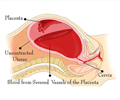Amiodarone
Oxytocin may increase the QTc-prolonging activities of Amiodarone.
Anagrelide
Oxytocin may increase the QTc-prolonging activities of Anagrelide.
Arsenic Trioxide
Oxytocin may increase the QTc-prolonging activities of Arsenic trioxide.
Advertisement
Artemether
Oxytocin may increase the QTc-prolonging activities of Artemether.
Asenapine
Oxytocin may increase the QTc-prolonging activities of Asenapine.
Azithromycin
Oxytocin may increase the QTc-prolonging activities of Azithromycin.
Advertisement
Bedaquiline
Oxytocin may increase the QTc-prolonging activities of Bedaquiline.
Carboprost
The risk or severity of adverse effects can be increased when Carboprost Tromethamine is combined with Oxytocin.
Carboprost Tromethamine
The risk or severity of adverse effects can be increased when Carboprost Tromethamine is combined with Oxytocin.
Advertisement
Ceritinib
Oxytocin may increase the QTc-prolonging activities of Ceritinib.
Chloroquine
Oxytocin may increase the QTc-prolonging activities of Chloroquine.
Chlorpromazine
Oxytocin may increase the QTc-prolonging activities of Chlorpromazine.
Ciprofloxacin
Oxytocin may increase the QTc-prolonging activities of Ciprofloxacin.
Cisapride
Oxytocin may increase the QTc-prolonging activities of Cisapride.
Citalopram
Oxytocin may increase the QTc-prolonging activities of Citalopram.
Clarithromycin
Oxytocin may increase the QTc-prolonging activities of Clarithromycin.
Clozapine
Oxytocin may increase the QTc-prolonging activities of Clozapine.
Crizotinib
Oxytocin may increase the QTc-prolonging activities of Crizotinib.
Dinoprostone
The risk or severity of adverse effects can be increased when Dinoprostone is combined with Oxytocin.
Disopyramide
Oxytocin may increase the QTc-prolonging activities of Disopyramide.
Dofetilide
Oxytocin may increase the QTc-prolonging activities of Dofetilide.
Dolasetron
Oxytocin may increase the QTc-prolonging activities of Dolasetron.
Domperidone
Oxytocin may increase the QTc-prolonging activities of Domperidone.
Dronedarone
Oxytocin may increase the QTc-prolonging activities of Dronedarone.
Droperidol
Oxytocin may increase the QTc-prolonging activities of Droperidol.
Eliglustat
Oxytocin may increase the QTc-prolonging activities of Eliglustat.
Erythromycin
Oxytocin may increase the QTc-prolonging activities of Erythromycin.
Escitalopram
Oxytocin may increase the QTc-prolonging activities of Escitalopram.
Flecainide
Oxytocin may increase the QTc-prolonging activities of Flecainide.
Fluoxetine
Oxytocin may increase the QTc-prolonging activities of Fluoxetine.
Flupenthixol
Oxytocin may increase the QTc-prolonging activities of Flupentixol.
Gadobenate
Oxytocin may increase the QTc-prolonging activities of Gadobenic acid.
Gemifloxacin
Oxytocin may increase the QTc-prolonging activities of Gemifloxacin.
Gemifloxacin Mesylate
Oxytocin may increase the QTc-prolonging activities of Gemifloxacin.
Goserelin
Oxytocin may increase the QTc-prolonging activities of Goserelin.
Granisetron
Oxytocin may increase the QTc-prolonging activities of Granisetron.
Haloperidol
Oxytocin may increase the QTc-prolonging activities of Haloperidol.
Ibutilide
Oxytocin may increase the QTc-prolonging activities of Ibutilide.
Iloperidone
Oxytocin may increase the QTc-prolonging activities of Iloperidone.
Lenvatinib
Oxytocin may increase the QTc-prolonging activities of Lenvatinib.
Lenvatinib Mesylate
Oxytocin may increase the QTc-prolonging activities of Lenvatinib.
Leuprolide
Oxytocin may increase the QTc-prolonging activities of Leuprolide.
Levofloxacin
Oxytocin may increase the QTc-prolonging activities of Levofloxacin.
Levofloxacin Anhydrous
Oxytocin may increase the QTc-prolonging activities of Levofloxacin.
Lopinavir
Oxytocin may increase the QTc-prolonging activities of Lopinavir.
Lumefantrine
Oxytocin may increase the QTc-prolonging activities of Lumefantrine.
Methadone
Oxytocin may increase the QTc-prolonging activities of Methadone.
Mifepristone
Mifepristone may increase the QTc-prolonging activities of Oxytocin.
Misoprostol
The risk or severity of adverse effects can be increased when Misoprostol is combined with Oxytocin.
Moxifloxacin
Oxytocin may increase the QTc-prolonging activities of Moxifloxacin.
Nilotinib
Oxytocin may increase the QTc-prolonging activities of Nilotinib.
Ofloxacin
Oxytocin may increase the QTc-prolonging activities of Ofloxacin.
Ondansetron
Oxytocin may increase the QTc-prolonging activities of Ondansetron.
Paliperidone
Oxytocin may increase the QTc-prolonging activities of Paliperidone.
Panobinostat
Oxytocin may increase the QTc-prolonging activities of Panobinostat.
Pazopanib
Oxytocin may increase the QTc-prolonging activities of Pazopanib.
Pentamidine
Oxytocin may increase the QTc-prolonging activities of Pentamidine.
Perflutren
Oxytocin may increase the QTc-prolonging activities of Perflutren.
Pimozide
Oxytocin may increase the QTc-prolonging activities of Pimozide.
Primaquine
Oxytocin may increase the QTc-prolonging activities of Primaquine.
Procainamide
Oxytocin may increase the QTc-prolonging activities of Procainamide.
Promazine
Oxytocin may increase the QTc-prolonging activities of Promazine.
Propafenone
Oxytocin may increase the QTc-prolonging activities of Propafenone.
Quetiapine
Oxytocin may increase the QTc-prolonging activities of Quetiapine.
Quetiapine fumarate
Oxytocin may increase the QTc-prolonging activities of Quetiapine.
Quinidine
Oxytocin may increase the QTc-prolonging activities of Quinidine.
Quinine
Oxytocin may increase the QTc-prolonging activities of Quinine.
Saquinavir
Oxytocin may increase the QTc-prolonging activities of Saquinavir.
Saquinavir Mesylate
Oxytocin may increase the QTc-prolonging activities of Saquinavir.
Sotalol
Oxytocin may increase the QTc-prolonging activities of Sotalol.
Sulfisoxazole
Oxytocin may increase the QTc-prolonging activities of Sulfisoxazole.
Telavancin
Oxytocin may increase the QTc-prolonging activities of Telavancin.
Telithromycin
Oxytocin may increase the QTc-prolonging activities of Telithromycin.
Tetrabenazine
Oxytocin may increase the QTc-prolonging activities of Tetrabenazine.
Thioridazine
Oxytocin may increase the QTc-prolonging activities of Thioridazine.
Toremifene
Oxytocin may increase the QTc-prolonging activities of Toremifene.
Vandetanib
Oxytocin may increase the QTc-prolonging activities of Vandetanib.
Vemurafenib
Oxytocin may increase the QTc-prolonging activities of Vemurafenib.
Ziprasidone
Oxytocin may increase the QTc-prolonging activities of Ziprasidone.
Zuclopenthixol
Oxytocin may increase the QTc-prolonging activities of Zuclopenthixol.








